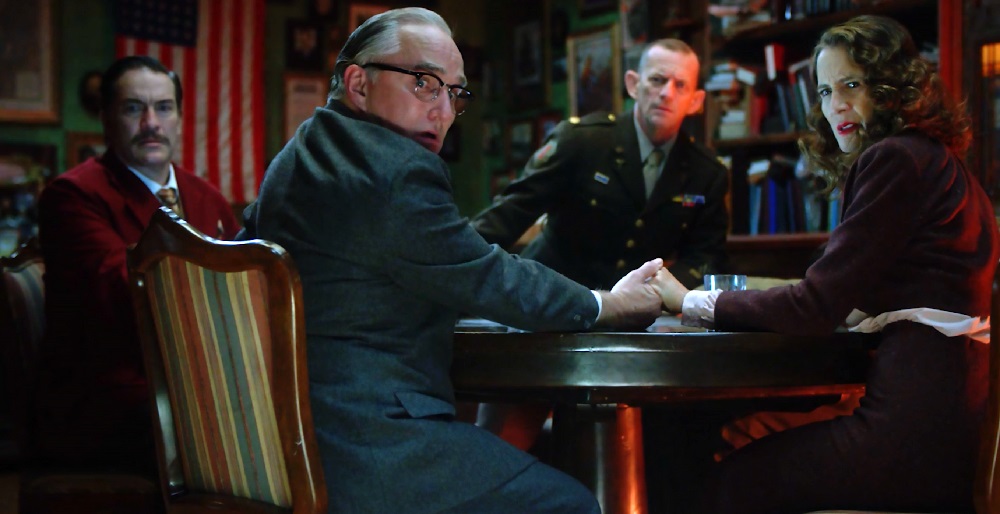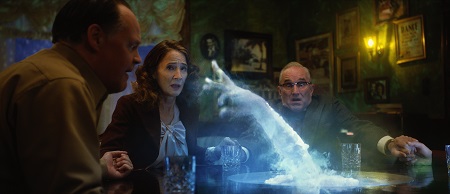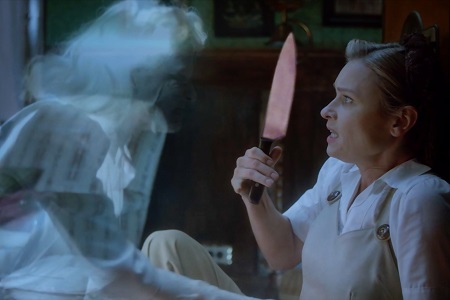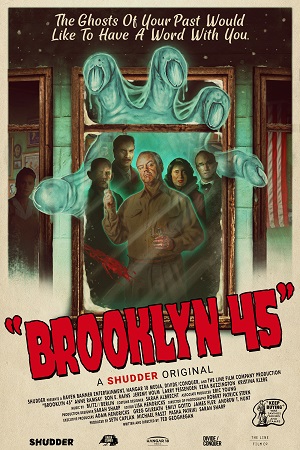
Ghosts of the Recent Past Haunt the Battle-Scarred Veterans of Brooklyn 45
On a cold, late-December night in 1945, five WWII veterans reunite in the Brooklyn brownstone of Lt. Col. Clive “Hock” Hockstatter (Larry Fessenden), their former commanding officer. They are there, two days after Christmas, to try and ease their friend’s pain after his wife’s suicide roughly a month earlier, on Thanksgiving. The remainder of the group comprises Maj. Paul DiFranco (Ezra Buzzington), Maj. Archibald Stanton (Jeremy Holm), former crack Army interrogator Marla Sheridan (Anne Ramsay), and her Pentagon pencil pusher husband, Bob (Ron E. Rains).
After a few drinks and some polite (and not-so-polite) conversation, Hock nonchalantly reveals why he has brought them all together: He wants their help in proving the existence of the afterlife. He refuses to believe his late wife is roasting in hell. Hock says he wants some sort of confirmation. He insists they have a séance to try to contact her spirit, and he isn’t about to let anyone out of his home until they follow his orders one last time.
A passing glance at the scenario for Brooklyn 45 may lead a potential viewer to surmise that the film is a stripped-down change of pace for acclaimed writer-director Ted Geoghegan. This could not be further from the truth. While a little less expressively cinematic than either We Are Still Here or Mohawk, this moody, character-driven mystery is as morally and thematically complex as either of the filmmaker’s previous efforts. If Judgment at Nuremberg, 12 Angry Men, The Thirteenth Chair, or almost any thriller featuring a Ouija board could combine their DNA to produce a genetically engineered offspring, this would likely be it.
By design, this drama is inherently theatrical. Geoghegan’s airtight script could easily end up being performed on an off-Broadway stage, and I doubt anyone would bat an eyelash. It’s a tightly wound mystery of identity, regret, ghosts (both real and metaphorical), friendship, and personal responsibility, all set in a morally gray netherworld, with each character dealing with varying forms of PTSD from their time on (or near) the battlefield. There’s nothing easy or comforting about where things are headed for these five veterans. Had this film been made during the film noir heyday of the 1950s, I could easily imagine the likes of Jean Negulesco or John Farrow excitedly taking up residence behind the camera to direct.
For reasons I am not going to reveal here, a sixth individual enters the story at a critical juncture, Huck’s German immigrant neighbor Hildegard Baumann (Kristina Klebe). Fueled by equal parts of paranoia and propaganda, Huck’s psychologically damaged dead wife was certain this woman was a Nazi spy, but because no one — including her husband — believed her, she took her own life. Suddenly the group is forced to reevaluate the situation when they find they are locked inside Huck’s parlor, their only way out being to put Hildegard on trial for espionage and subsequently execute her.
This leads to a variety of explosive revelations, not the least of which are horrendous war crimes committed under orders to save American lives and led to the gruesome deaths of a room full of German children. No one has a clean conscience, and while each person is trying to put the past behind them, Huck’s dinner party has made that impossible. They’ll have to look not only at one another as deeply buried secrets are exposed but also into a mirror image that’s staring straight back at them.
The dialogue can get a little stilted, and there are moments where Geoghegan’s direction feels a bit heavy-handed. Additionally, while there is certainly something to be said about the immaculate, period-rich production design by Sarah Sharp (The Stylist) — so many little touches leap off the screen — there’s equally something too colorfully vibrant about the camerawork of cinematographer Robert Patrick Stern (Revealer). It was too clean, and as technically precise as the visuals may be, there are still moments where I felt I was watching Masterpiece Theatre on PBS and not a motion picture akin to Geoghegan’s previous features.
It is a testament to the director’s skill and his sublime script that none of that matters. There’s also the superb ensemble, with a sensational Fessenden as the clear standout and the talented Ramsay and Klebe not far behind him. Geoghegan never takes the easy way out; he asks tough questions and leaves it up to the audience to ascertain the majority of the answers. He also does not skimp on the horror elements, especially during the climax, and while this is a slow-burn thriller, the spurts of gore happen just at the right moment and, even better, shockingly when I least expected them to.
Good. Evil. The line separating them vanishes during Brooklyn 45, and Huck’s houseguests must stare directly at the Shakespearean blood covering their hands as their evening reunion transforms into something unforeseeably monstrous. The ghosts haunting them are real. How they go about facing them may determine who survives until the morning and who will join Huck’s wife in the hereafter.
Film Rating: 3½ (out of 4)








